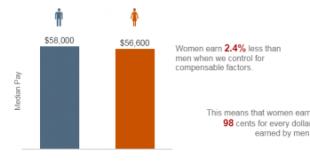WEA Commentaries Volume 10, Issue 1 – February 2020download whole issue Simpson’s Paradox – Asad ZamanHow International Corporations Could Be Taxed and Why the US is Working to Prevent It – Norbert HäringThe Transnational Corporation and Economics – Grazia Ietto- GilliesChallenges of Complexity Economics – Joachim H. Spangenberg and Lia PolotzekWEA Commentaries Appoints New Co-EditorsWEA contact details Please click here to support the WEA...
Read More »We can develop new drugs without patent monopolies # 54,217
from Dean Baker It is often said that intellectuals have a hard time dealing with new ideas. This is perhaps nowhere better demonstrated with the fixation with patent monopolies as the primary mechanism for financing the development of new drugs. Bloomberg gave us a beautiful example of this narrow mindedness with a column from Max Nisen on the possibility that China may require the compulsory licensing of a patent on a drug developed by Gilead, in order to produce a treatment for the...
Read More »Econometrics — fictions masquerading as science
from Lars Syll In econometrics one often gets the feeling that many of its practitioners think of it as a kind of automatic inferential machine: input data and out comes casual knowledge. This is like pulling a rabbit from a hat. Great — but first you have to put the rabbit in the hat. And this is where assumptions come into the picture. As social scientists — and economists — we have to confront the all-important question of how to handle uncertainty and randomness. Should we equate...
Read More »Mistaken methodology of econometrics
from Asad Zaman This is the continuation of a sequence of posts on methodology of economics and econometrics (For previous posts, see: Mistaken Methodologies of Science 1, Models and Realities 2, Thinking about Thinking 3, Errors of Empiricism 4, Three Types of Models 5, Unrealistic Mental Models 6, The WHY of Crazy Models 7, The Knowledge of Childless Philosophers 8, Beyond Kant 9,). In this (10th) post, we consider the methodology of econometrics, which is based on Baconian or...
Read More »The left becomes center: financial transactions taxes and beyond
from Dean Baker Last week, Antonio Weiss, along with co-author Laura Kawano, released a paper advocating a financial transactions tax (FTT). I have long been an advocate of FTTs, so I’m always glad to see another paper making the case. However, what made this paper especially noteworthy is Weiss’s background. Weiss had been a top Treasury official under President Obama, and previously a partner at the investment bank, Lazard, so he is not the sort of person who would typically be expected...
Read More »Understanding income: You can’t get there from here
from Blair Fix You can’t get the right answer when you ask the wrong question. This truism, I’ve come to believe, explains much of what is wrong with economics. When it comes to studying income, economists ask the wrong question. Economists, I argue, have mostly asked: is income fair? The problem is that this is a moral question, not a scientific one. It has no scientific answer. When the wrong questions get entrenched You can’t get the right answer when you ask the wrong question. This...
Read More »Problems of index fund capitalism
fro Norbert Häring If the trend of the last two decades continues, index funds could control 40 percent of the voting rights in the largest corporations by 2040.The share is already up to 25 percent in the US. There a two perspectives on this. Some scholars say it threatens shareholder value, others fear it will lead to too much of it. I side with the latter. … Law-and-economics professors Lucian Bebchuk and Scott Hirst from the Universities of Harvard and Boston make the extrapolation of...
Read More »Overcontrolling in econometrics — a wasteful practice ridden with errors
from Lars Syll The gender pay gap is a fact that, sad to say, to a non-negligible extent is the result of discrimination. And even though many women are not deliberately discriminated against, but rather self-select into lower-wage jobs, this in no way magically explains away the discrimination gap. As decades of socialization research has shown, women may be ‘structural’ victims of impersonal social mechanisms that in different ways aggrieve them. Wage discrimination is unacceptable....
Read More »Beyond Kant
from Asad Zaman This is a continuation of previous post on “The Knowledge of Childless Philosophers“. I would like to clarify some aspects of the theory of knowledge which have become muddled and confused because childless philosophers did not observe how children learn about the world, and acquire knowledge starting from scratch. If they had taken this as the basic model for how we acquire knowledge, they would have been able to avoid a huge number of mistakes. A realist methodology for...
Read More »How do you spot a crank?
from Blair Fix I confess that I have a recurring nightmare. In it, I realize that everything I’ve ever written about economics is wrong. Neoclassical economics is not, as I’ve repeatedly claimed, a pile of bullshit. In this nightmare, neoclassical economics is correct. And as a strident critic of neoclassical theory, I realize the horrible truth. I’m a crank! I wake up in a cold sweat, wondering if I’m wasting my life. Then, as rational thought returns, my fears ebb away. I think about...
Read More » Real-World Economics Review
Real-World Economics Review




